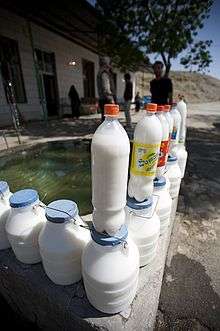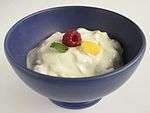Doogh
Doogh or ayran (Persian: دوغ, romanized: dūgh) (Albanian: dhallë; Azerbaijani: ayran; Arabic: شنينة šinīna or عيران ayran; Syriac: ܕܘܓ̄ܐ dove; Turkish: ayran; Armenian: թան t'an; Pashto: شلومبې; Bulgarian: айрян; Kurdish: mastaw) is a cold savory yogurt-based beverage that is mixed with salt.[1][2] It is popular in Central Asia, Eastern Europe, and the Middle East.[2][3][4][5][6][7][8]
 | |
| Alternative names | Ayran, tan, dove, or yogurt milk |
|---|---|
| Type | Dairy product |
| Course | Beverage |
| Place of origin | Iran |
| Region or state | Central Asia, Middle East |
| Serving temperature | Cold |
| Main ingredients | Yogurt, water, salt |
Preparation
Doogh is served chilled and often as an accompaniment to grilled meat or rice,[9] especially during summer.[10] It is made by mixing yoghurt with chilled or iced water[11] and is sometimes carbonated and seasoned with mint.[12][13][14] Doogh has been variously described as "diluted yogurt"[4] and "a most refreshing drink made by mixing yogurt with iced water".[15]
History
Doogh is an Iranian fermented drink[16][17] that has long been a popular drink and was consumed in ancient Persia (modern-day Iran).[18] Described by an 1886 source as a cold drink of curdled milk and water seasoned with mint,[19] its name derives from the Persian word for milking, dooshidan.[12]
Other similar drinks include ayran in Turkey, t’an in Armenia and lassi in Southern Asia and are popular in Asian countries; however, they can differ from doogh.[20] According to Nevin Halıcı, ayran was consumed by Turkic people of Central Asia.[4]
A c. 1000 CE Turkish dictionary, Dīwān ul-Lughat al-Turk, defines ayran as a "drink made out of milk."[21]
Turkish national drink status
Recep Tayyip Erdoğan, a conservative Turkish politician who has held the posts of President and Prime Minister, has promoted ayran as a national drink.[22] Speaking at a 2013 WHO Global Alcohol Policy Conference held in Istanbul, Erdoğan contrasted ayran with alcohol, which he claimed was a recent introduction to Turkey.
Nevertheless, sales of ayran in Turkey may lag behind other non-alcoholic beverages.[23] According to a 2015 joint statement from the Soft Drink Producers Association, the Sparkling Water Producers Association, and the Milk Producers and Exporters Union of Turkey, ayran consumption during Ramadan had declined every year for the years 2010 to 2015.[23]
In 2015, Turkey's Customs and Trade Ministry, controlled by Erdoğan's party, imposed a 220,000 TL fine (approximately $70,000) on state-owned Çaykur manufacturers, stating that ayran had been "insulted without reason" in one of their advertisements for iced tea, in which the rapper Ceza rapped that ayran makes him sleepy; the ministry halted advertisements of Çaykur's competing ice-tea product.[24]
Variations
Salt can be added, as can black pepper. Dried mint or pennyroyal can also be mixed in, as well as lime juice. One variation includes diced cucumbers to provide a crunchy texture to the beverage. Some varieties of doogh are carbonated.
See also
- Borhani, yogurt-based drink from Bangladesh
- Calpis, Japanese yogurt-based soft drink
- Chal, fermented camel's-milk
- Chaas, yogurt-based drink made with yogurt, salt and water, and occasional mint and coriander leaves
- Chalap, beverage consisting of fermented milk, salt, and carbonated water
- Filmjölk, a yogurt drink from Sweden
- Kefir, fermented milk drink made with yeast grains
- Kumis, fermented mare's milk drink[4]
- Lassi, yogurt-based drink from the Indian Subcontinent
- Qatiq, fermented-milk beverage
- Yayık ayranı, Turkish soured and churned yogurt-based drink
References
- Tamime, A. Y., ed. (2008). Fermented Milks. John Wiley & Sons. p. 124. ISBN 9781405172387.
- Fatih, Yildiz (2010). Development and Manufacture of Yogurt and Other Functional Dairy Products. CRC Press. p. 10. ISBN 9781420082081.
- Jacobson, Sarina; Weiner, Danya (2008). Yogurt: More Than 70 Delicious & Healthy Recipes. Sterling. p. 6. ISBN 1402747594.
- Halici, Nevin (27 April 2013). "Turkish Delights". Gastronomica: The Journal of Critical Food Studies. University of California Press. 1 (1): 92–93.
- Kanan, Onur. "Ayran, Turkey's favorite summer drink". DailySabah. Retrieved 2019-07-09.
- Strnadel, Leslie; Erdley, Patrick (2012). Bulgaria. Other Places Travel Guide. Other Places Publishing. p. 58. ISBN 9780982261996.
- Nazif Shahrani, M. (2013). The Kirghiz and Wakhi of Afghanistan. University of Washington Press. pp. 92–93. ISBN 9780295803784.
- Tamime, A. Y., ed. (2008). Fermented Milks. John Wiley & Sons. p. 96. ISBN 9781405172387.
- "Turkish Buttermilk". www.kultur.gov.tr. Ministry of Culture and Tourism, Turkey. Retrieved 5 October 2013.
- Gina Husamettin. "Ayran – Turkish national beverage". balkon3.com. Retrieved 5 October 2013.
- Davis, P. H. (1956). "Lake Van and Turkish Kurdistan: A Botanical Journey". The Geographical Journal. 122 (2): 156–165. doi:10.2307/1790844.
- Islamic Republic of Iran (26–29 January 2009). Project Document for a Regional Standard for Doogh (CX/NEA 09/5/8) (PDF). Tunis, Tunisia: United Nations. Joint FAO/WHO food standards programme of the FAO/WHO coordinating committee for the Near East. Retrieved 26 June 2011.
- A. Y. Tamime (ed.) (2008). Fermented Milks. John Wiley & Sons. p. 124. ISBN 9781405172387.CS1 maint: extra text: authors list (link)
- Yildiz Fatih (2010). Development and Manufacture of Yogurt and Other Functional Dairy Products. CRC Press. p. 10. ISBN 9781420082081.
- Lake Van and Turkish Kurdistan: A Botanical Journey P. H. Davis The Geographical Journal, Vol. 122, No. 2 (Jun., 1956), pp. 156–165 Published by: The Royal Geographical Society (with the Institute of British Geographers) Article doi:10.2307/1790844
- Nishinari, Katsuyoshi (2019-12-31). Textural Characteristics of World Foods. John Wiley & Sons. ISBN 978-1-119-43079-7.
Doogh is an Iranian type of traditional fermented dairy-based drinks that is usually produced by mixing set or stirred yogurt and water at the same rate, as well as some aqueous extracts of local herbs, and spices such as thyme.
- Katz, Sandor Ellix (2016). Wild Fermentation: The Flavor, Nutrition, and Craft of Live-Culture Foods, 2nd Edition. Chelsea Green Publishing. p. 117. ISBN 978-1-60358-628-3.
- Simmons, Shirin (2007). Treasury of Persian Cuisine. Stamford House Publishing. ISBN 1-904985-56-4.
- Grosart, Alexander (17 July 1886). "Soor-doock" and "doogh". The Academy and literature. 30. Blackburn. p. 59.
- Nishinari, Katsuyoshi (2019-12-31). Textural Characteristics of World Foods. John Wiley & Sons. ISBN 978-1-119-43079-7.
Doogh consumption is common in Asian countries (e.g. ayran in Turkey, than in Armenia, lassi in southern Asia). However, they may differ from doogh in dilution ratio, rheological characteristics, fat content, and sensory properties.
- "Ayran". Etimoloji Türkçe (in Turkish). Telif Hakları. Retrieved 31 August 2014.
- "PM says Turkey's national drink is doogh, not beer". Zaman. 27 April 2013. Archived from the original on 2015-11-17.
- "Turks turn away from 'national drink' despite Erdoğan". Zaman. 22 June 2015. Archived from the original on 2015-11-17.
- Çelikkan, Erdinç (9 November 2015). "State-owned tea firm fined 220,000 liras for 'insulting ayran' in ads". Hürriyet.
